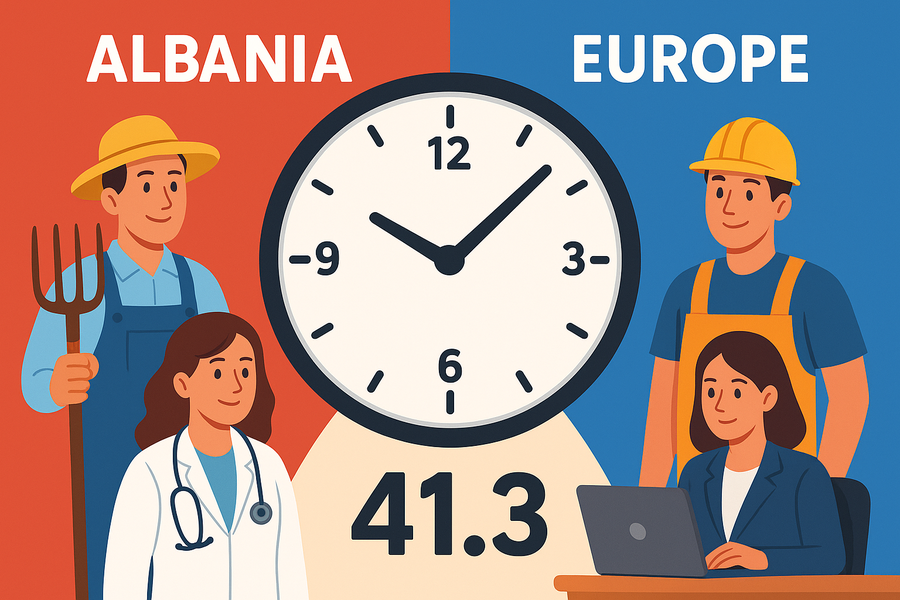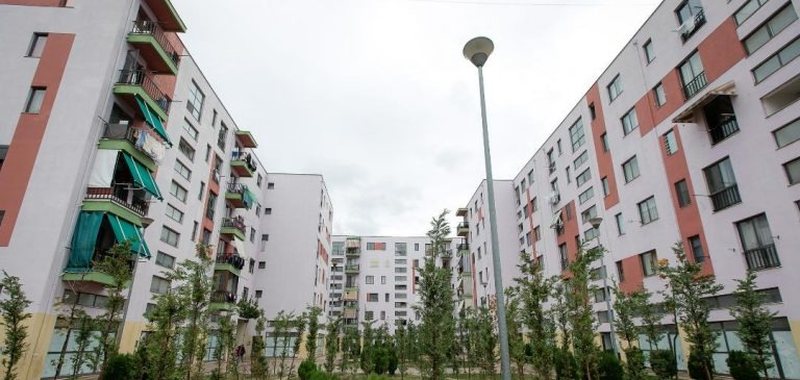Albanians in 2024 worked less than a year ago/ But the 5-hour difference with the European Union remains strong

Albanians in 2024 worked less than a year ago, but still significantly more than Europeans. The latest data shows that the average weekly working hours in Albania have fallen from 41.6 in 2023 to 41.3 in 2024. A small change, almost imperceptible, but enough to say that Albanians have slowed down. And yet, even after this “break”, the difference with the European Union remains strong. The EU average is only 36 hours per week, five hours less than here, almost an extra day of work.
In 2024, data on average weekly working hours show that the sector where individuals work the most is that of trade, transport, hotels and business and administrative services with an average of 46.8 hours per week. This group includes high-paced activities and often requires long hours, reflecting a high work intensity. It is followed by the manufacturing sector with 46.4 hours per week, where work on production lines and factories requires constant dedication and often meeting daily quotas. Construction with 45.1 hours and extractive industries, energy, gas and water supply with 43.2 hours per week also present a significant workload, reflecting the physical and technical nature of work in these fields.
On the other hand, agriculture has the lowest average with 35.5 hours per week, which may be related to the season, the decentralized nature of the work and the fact that many workers are self-employed. The public sector, seemingly more “comfortable”, closes with 40.5 hours per week, which indicates a more regular structure of working hours and respect for legal rules in the public sector. In general, the private sector and that related to commercial services tend to have a higher workload, while the public sectors and agriculture present a more moderate pace.
An Albanian works five hours more per week than an average European. The difference becomes even more extreme with the Netherlands, where professional life ends after 32.1 hours. This means that a Dutch person has almost two more days off each month, while an Albanian spends more time at work, often without seeing it reflected in well-being. Our neighbors keep pace with us, Serbia with 41.3 hours, Bosnia with 41.1, while Turkey sets the regional record with 43.1 hours.

Businesses prefer to save in euros - BoA: They grew by 3.7% in July. Transferable ones, in record amounts
Euro deposits have also increased significantly for businesses. According to data from the Bank of Albania, around 283 billion lek were business deposits in......

Energy losses fell by 0.7% - The improvement in the indicator came from the transmission system, increasing distribution
Electricity losses in the network decreased during the second quarter of 2025 compared to the same period a year earlier. According to data from the......

Closer to opening the last group of chapters with the EU - Dhuka: Review by member states expected to close negotiations
Within a few months, the final group of chapters with the European Union for membership negotiations is expected to be opened, which include chapters such as......

Tourism pushes construction of new hotels/ Second quarter, surfaces increase 6-fold from last year
The Institute of Statistics has recently reported statistics regarding construction permits issued during the second quarter of the year. Given that this......

AMF: Warning about fraudulent platforms TXEX, XUEXA, GROKREXDUU and similar platforms
The Financial Supervisory Authority (AMF), in exercising its legal powers to protect the interests of investors and maintain the integrity of the markets......

30% of road transport will switch to rail - Plans until 2030, report: Traffic relief and air pollution reduction
Transport in our country is expected to undergo a transformation in the coming years, which will also affect the reduction of greenhouse gas emissions and......

Pensions, 1 billion euros fill the state coffers - 7-month period, income in the scheme increases by 118 million euros
The year 2025 is performing positively in terms of pension scheme provision, as income from social security and health insurance contributions has increased......

29 thousand changes of residence in the first 6 months - 70% increase compared to January-June last year
During the first half of this year, around 29 thousand changes of residence were carried out in the territory of the Republic of Albania. Data from the......





















